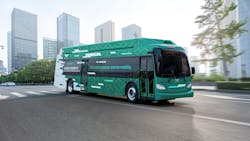NFI unveils next generation hydrogen fuel cell-electric bus, the Xcelsior CHARGE FC™
NFI Group Inc. subsidiaries New Flyer of America Inc. and New Flyer Industries Canada ULC (together New Flyer) unveiled its next generation, zero-emission hydrogen fuel cell-electric Xcelsior CHARGE FC™ heavy-duty transit bus.
NFI says the Xcelsior CHARGE FC™ uses environmentally friendly hydrogen and fuel-cell technology to create electricity and to charge batteries for zero-emission extended-range, saving 85-175 tons of greenhouse gas per year from tailpipe emissions compared to a traditional diesel bus. With a range of more than 370 miles, the bus can be refueled in six to 20 minutes depending on the model and operating conditions and requires no overnight plug-in electrical re-charging. The only tailpipe output is clean water vapor.
Built on the Xcelsior® platform with more than 16,000 buses delivered to date, New Flyer's battery-electric and fuel cell-electric models have surpassed over 15 million electric vehicle (EV) service miles. Drawing upon more than 20 years of experience producing fuel cell-electric buses for North American operators, New Flyer says it has applied the best of zero-emissions design and innovative fuel cell technologies to develop its most advanced hydrogen fuel cell-electric bus yet.
New Flyer says its Xcelsior CHARGE FC™ incorporates four distinct technology advancements to deliver a long-range, high-performance hydrogen fuel cell-electric bus, including a lighter, simpler and more efficient heavy-duty fuel cell power module that is easier to service; recyclable, high-power batteries delivering a longer range of more than 370 of miles of highway driving without refueling; a redesigned waterproof (IP 67 and IP 69 rated) battery enclosure providing improved serviceability; and a high-grade, electric drive traction system with up to 90 percent energy recovery.
“The Xcelsior CHARGE FC includes the latest technology innovations. The new streamlined design is easier to service and maintain, delivers longer range at highway speeds, improves energy recovery and is smart city-capable, making it the most advanced hydrogen fuel cell-electric bus available on the market,” said Chris Stoddart, president, North American Bus and Coach, NFI. “With the Xcelsior CHARGE FC now added to NFI's market-leading EV and AV vehicle lineup, NFI is undeniably leading a new mobility era, delivering unmatched performance and sustainability benefits to transit operators.”
The new FCmove™-HD+ fuel cell power module from Ballard Power Systems introduces a more compact and robust design with lifecycle cost reductions achieved through lower maintenance requirements, higher reliability and fewer parts. The integrated design houses all subcomponents in a single enclosure; it is smaller, lighter and uses 50 percent fewer parts, making it easier to service and maintain according to New Flyer. It offers more than 97 percent fuel cell power availability while in service and a wider operating range across a variety of climates.
New Flyer manufactures its energy storage system enclosures in its bus production facilities. The battery packaging, developed by New Flyer, utilizes a waterproof enclosure design that is lighter and easier to maintain, decreasing the number of parts by 90 percent. Its streamlined design enables technicians to plug in or unplug individual battery packs, reducing bus downtime and allowing easier replacement.
High-power, rapid-charge batteries utilize an active liquid cooling system to maintain consistent temperatures and respond quickly to increases in power demand and environmental loads. New Flyer says the batteries are more efficient in demanding applications, offer 40 percent more energy and deliver 44 percent more range at highway speeds without compromising quality. The batteries are also appropriate for Li-Cycle’s closed-loop lithium-ion battery recycling program that facilitates full-circle sustainable mobility and material recapture through recovery of critical materials from lithium-ion batteries and reintroducing them into the supply chain.
Finally, the Siemens ELFA™ 3 traction system delivers up to 90 percent energy recovery through regenerative braking and weighs 69 percent less than ELFA™ 2, delivering a more efficient design through compact inverters and embedded drive controllers.
“More and more cities are making the commitment to 100% zero-emission fleets and Xcelsior CHARGE FC provides an ideal complement to battery-electric buses for agencies wanting to integrate the reliable long-range performance of hydrogen fuel cell-electric buses,” said Jennifer McNeill, vice president of public sector sales and marketing, New Flyer and MCI. “The Xcelsior CHARGE FC also advances our effort to continue driving the adoption of zero-emission mobility with a safe, scalable and streamlined approach to the zero-emission manufacturing process. In turn, we simplify training for our production teams and those of transit agencies across North America to continue supporting reskilling, upskilling and workforce development to ensure successful zero-emission deployments.”
The Xcelsior CHARGE FC™ is available in 40-foot and 60-foot lengths and both models meet the Federal Transit Administration Model Bus Testing Program at Altoona, Penn. New Flyer says it remains the only North American manufacturer to offer both 40-foot and 60-foot fuel cell-electric models that qualify for federal funding.
To provide workforce development on Xcelsior CHARGE FC™ technologies, New Flyer will host a no-cost virtual training session on Nov. 10, 2022, through the Vehicle Innovation Center.
